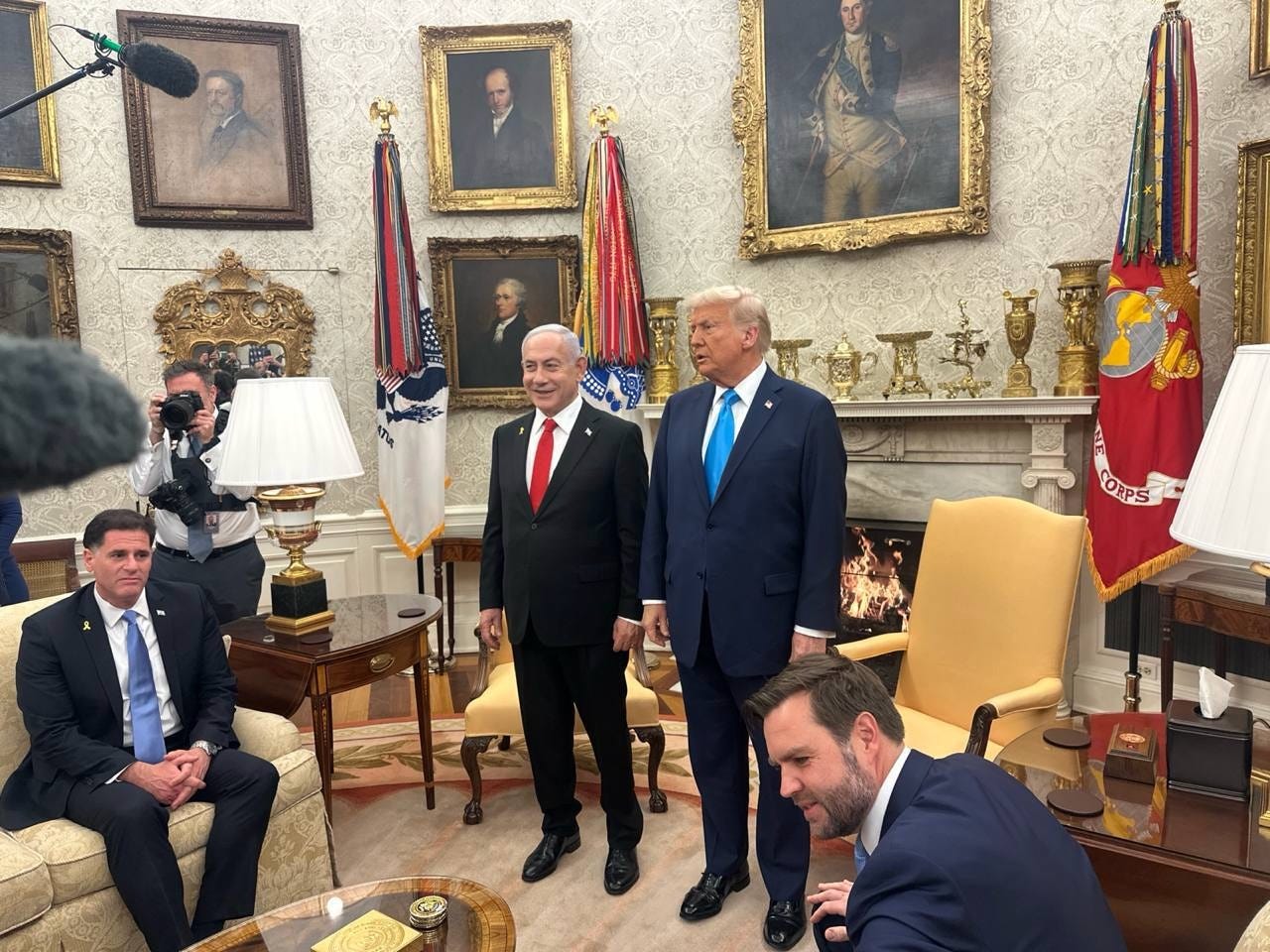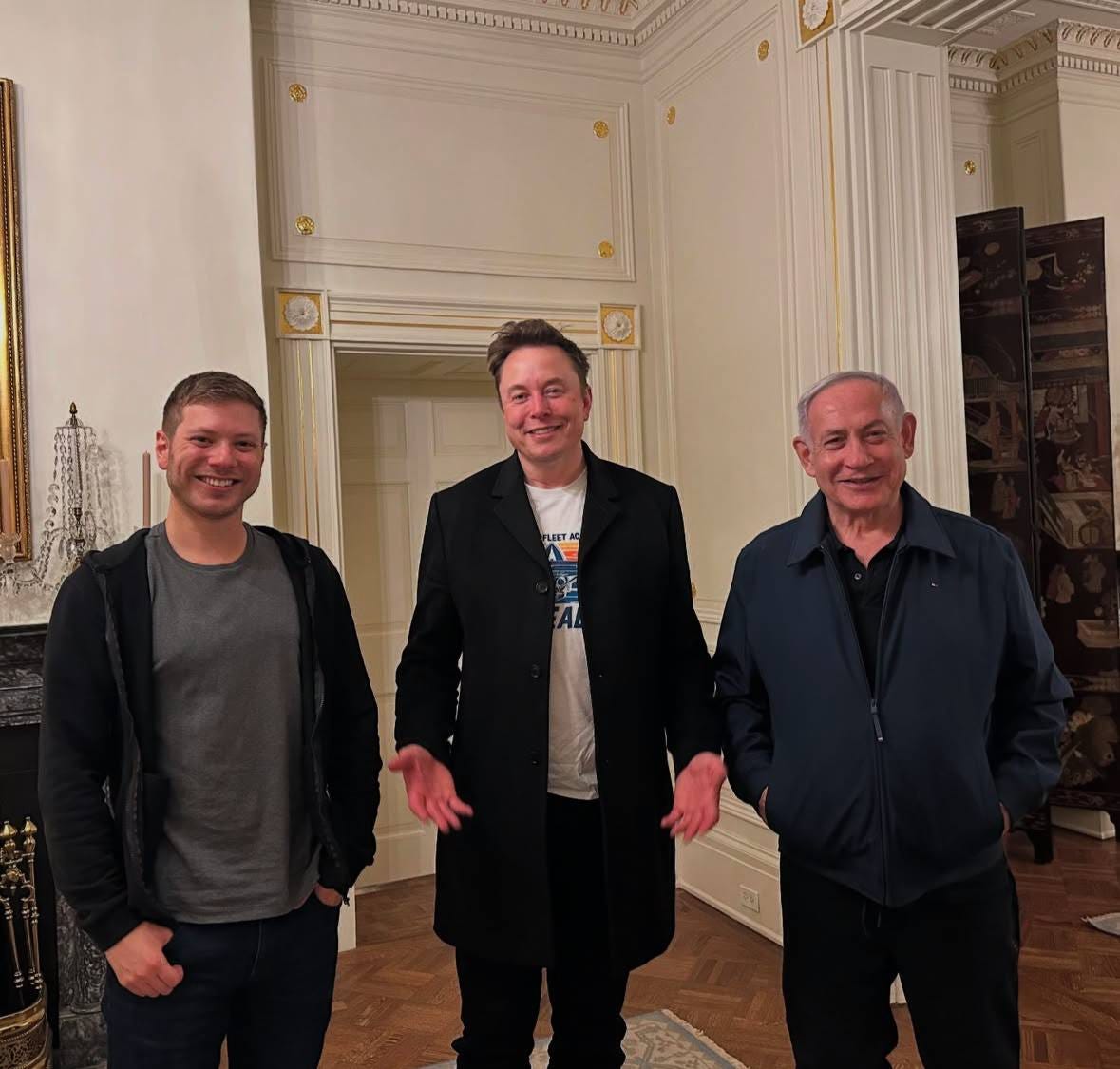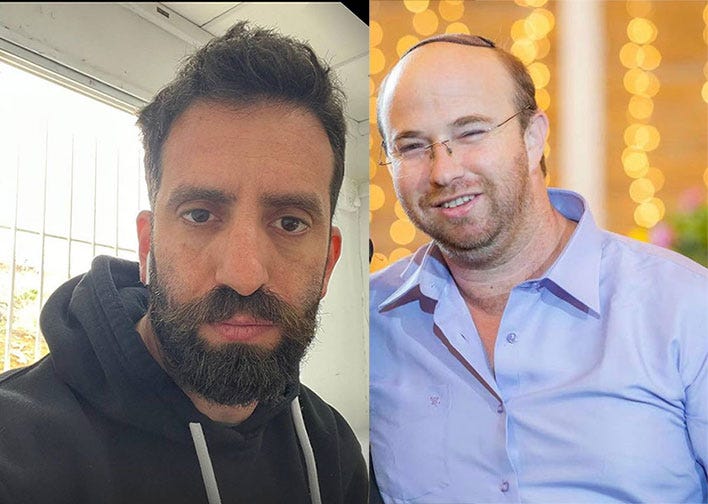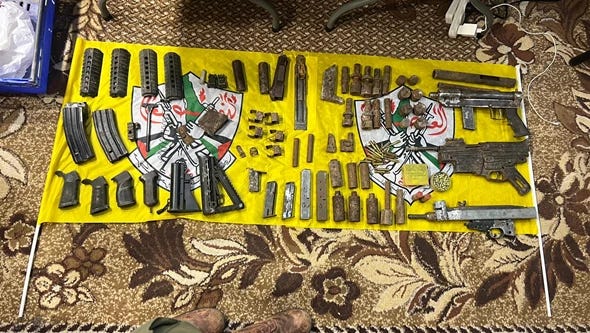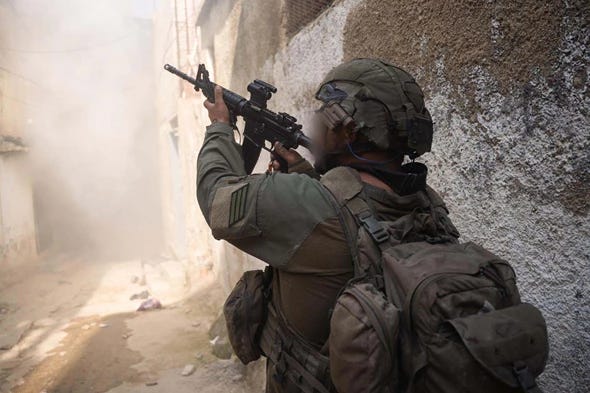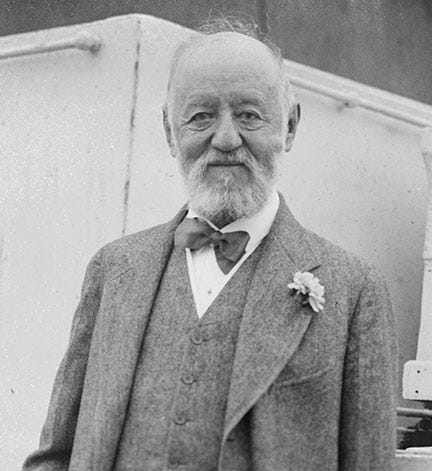DAY 487 IN CAPTIVITY • DAY 17 OF THE CEASEFIRE: Netanyahu-Trump Meeting, Two Reservists Killed In Jordan Valley
Tel Aviv Diary,
The long-awaited meeting between President Trump and Prime Minister Netanyahu took place tonight. In a rare gesture, President Trump greeted the Prime Minister Netanyahu at the entrance of the White House.
Typically, such meetings begin with a brief opportunity for the press to ask a few questions, known as a press spray. However, instead of the usual quick session, today's lasted 15 minutes, during which President Trump made most of the headlines.
When asked whether he believes he can secure the release of the remaining hostages, which could potentially earn him the Nobel Peace Prize, Trump responded, "I hope to bring them.”
Here are some of the key remarks:
Trump: “I hope to secure the Hostages’ Release, but I won’t get a Nobel Prize. Netanyahu is a great leader.”
Trump on Netanyahu: “We have the right man who has done a great job for a very long time, and together, we are a winning combination.”
Trump on Hamas: “We are dealing with very complex people.”
Trump: “The deal can definitely be finalized.”
Trump: “Netanyahu also wants peace.”
Netanyahu: “I want to bring all the hostages home while achieving all three war objectives—eliminating Hamas’ governmental and military capabilities and ensuring that Gaza will no longer pose a threat to Israel. I have three goals, and I believe the president can help us achieve them.”
Question: Do you still support a Palestinian state?
Trump: “A lot of things have changed. If you look at Gaza, there are barely any buildings standing; it’s a mess, it looks like hell. If they have a better place to go, they will go.”
Trump: “I don’t think people will want to return to Gaza.”
Trump: “Gaza is a demolition site right now. The buildings that are standing are going to collapse. Right now, you have a very dangerous situation in Gaza in terms of explosives. No one can live there. I don’t think people should be coming back to Gaza; Gaza is not a place to live in. They are living in hell. They would prefer to live in a beautiful alternative that is safe. Why would they want to return to a place that has been hell? I have seen it through pictures; no one should have to live there. You build really beautiful housing. Why should they go back? They are going to die; the same thing is going to happen. Asked how many people are you talking about? All of them: 1.7 million, 1.8 million. How
Trump: “It could be in Egypt, Jordan, or other places. It could be in five or six regions. They will want to leave because in Gaza, they are dying. As for settlements, what do Israelis have to seek in Gaza other than destruction and death?”
Trump: “I don’t want there to be settlements in Gaza.”
Netanyahu to Yona Leibzon: “We will get them out. We have already evacuated 70%. We will not abandon anyone. Hamas will not remain in Gaza.”
Asked whether, now that Iran is weak, this is the time to attack:
Trump: “It’s that simple—we will not allow Iran to obtain nuclear weapons.”
Trump: “The Palestinian Authority will have a very hard time ruling Gaza.”
Trump added: “There is a group of people who deny that October 7th happened just like the Holocaust that they deny.
Netanyahu: When Israel and the US work together, when I and President Trump work together we can make things happen (hostages).
At the press conference after the meeting, President Trump said that we had a great meeting and the alliance between Israel and the United States is unbreakable. Trump then listed his accomplishments in his first term, including moving the embassy to Jerusalem and building it. He went on to say that many more countries are going to sign up to the Abraham Accords. Trump said what we had was an all-out assault on Jews in the Jewish homeland. Trump repeated his plan to move the people of Gaza to a wonderful new place. Trump said the US would take over Gaza; we will own it and rebuild it into a wonderful place.
Netanyahu: To Trump- You are the greatest friend that Israel has ever had in the White House. He then went on to list everything that Trump did in his first term. He then went on to say everything Trump has done until now for Israel.
Netanyahu: Israel will end the war by winning the war.
When Trump was asked if Saudi Arabia would agree to normalization without a Palestinian state, he sidestepped the question other than saying the Saudis want peace. He also double-downed on the US taking over Gaza for redevelopment.
We will feature an analysis of the Netanyahu-Trump meeting tomorrow.
There were so many stories and so many different opinions about the potential outcomes and consequences of the Trump-Netanyahu meeting—it’s enough to make your head spin. The only thing we knew for certain is that Prime Minister Netanyahu met yesterday with Steve Witkoff, which the Prime Minister’s Office described as positive. Beyond that, little is known about what will happen next, though the White House affirmed President Trump's continued commitment to securing the safe return of all hostages.
Tonight, before his meeting with Netanyahu, President Trump signed a presidential memorandum to reinstate his “maximum pressure” campaign on Iran—an initiative designed to prevent Iran from acquiring nuclear weapons and to reduce its oil exports to zero. Trump said when he signed it “that Iran is too close to acquiring nuclear weapons.
Prior to the meeting with President Trump, Netanyahu and his son Yair, who spent the duration of the war in Miami, met with Elon Musk.
TERROR ATTACK IN THE JORDAN VALLEY
The day began with terrible news: a terrorist attack targeting a group of Reserve soldiers in the Jordan Valley. The well-planned assault on an Israeli Defense Forces (IDF) outpost early this morning resulted in multiple casualties and has raised serious concerns about perimeter security protocols. The incident, which involved a prolonged firefight, unfolded in several critical phases.
The attack began just before 6:00 AM when an armed assailant ambushed two soldiers conducting their routine dawn readiness check. The soldiers were leaving their fortified guard post, (known as a “pillbox”), when they encountered the attacker at point-blank range. The terrorist, equipped with a tactical vest, an M-16 rifle, and additional magazines, had reportedly infiltrated the area on foot overnight and waited until first light to strike.
During the initial confrontation, both soldiers sustained critical injuries from the close-range engagement. The two critically wounded later succumbed to their wounds. They were identified as: Sergeant Major (res.) Ofer Yung (39) Tel Aviv and Sergeant Major (res.) Avraham Tzvi Tzivka Friedman (41) from Kibbutz Ein Hanatziv.
The situation rapidly escalated into an extended firefight between the terrorist who had positioned himself at the outpost entrance, and eleven IDF troops stationed inside. Throughout the battle, the terrorist managed to breach both the outpost and pillbox structures, although military officials confirmed that he never reached the rooftop of the pillbox.
The IDF swiftly deployed two reinforcement teams to the scene—a reserve force led by a platoon commander and a unit under the direction of the battalion commander. Upon arrival, these forces established a secure perimeter and joined the ongoing engagement. The confrontation reached its peak when the attacker attempted to flee the outpost. A soldier from the battalion commander's unit successfully neutralized the threat with a well-placed fragmentation grenade.
While an armed Zik drone was prepared for deployment throughout the incident, military officials explained that the close-quarters nature of the combat rendered its use too risky for friendly forces. The IDF has recognized the need for a comprehensive tactical review of the incident, particularly focusing on why the attacker was not detected earlier by either the lookout soldier or existing security measures. It appears the terrorist infiltrated the small base undetected during the night.
WEST BANK
Following this morning's harrowing incident, the Army released a report detailing last month's activities in the West Bank.
Security Forces Operations in Judea and Samaria – January Report
During January, Israeli security forces conducted counterterrorism operations across Judea and Samaria to prevent and neutralize terror threats.
Throughout the month, the forces eliminated approximately 55 terrorists, including individuals involved in past attacks that resulted in the deaths of Israeli civilians, as well as terrorists who were en route to carry out attacks. Additionally, security forces arrested around 380 wanted terrorists.
Operations are currently ongoing in three combat zones: Jenin, Tulkarm, and the villages surrounding Homesh, where, for the first time, Eitan armored personnel carriers (APCs) have been deployed in northern Samaria.
In recent days, security forces have uncovered numerous weapons, including rifles, handguns, and explosive devices.
The security forces will continue their counterterrorism efforts throughout Judea and Samaria, ensuring the safety of Israeli civilians.
Weapons Seized by IDF Forces in Recent Days:
Ongoing Military Operations in Jenin, Tulkarm, and Homesh Villages:
ELIZABETH TSURKOV
Six months before the outbreak of Israel’s longest war, in March 2023, Israeli researcher Elizabeth Tsurkov was kidnapped in Baghdad by the pro-Iranian militia Kataib Hezbollah. Since then, the only sign of life from her came in a video released from her captivity in Iraq in November 2023, at a time when Israel was still in shock from the October 7 attack.
In recent days, various reports—some of which have been denied—have indicated efforts and negotiations between Israel and Iraq regarding her release. About two weeks ago, Iraq’s Foreign Minister stated that she is still alive.
Tsurkov was born in Russia and spent a number of years living in Israel. She has both Russian and Israeli citizenship, but before she went to Iraq, she lived in the US and worked as a researcher at Princeton. She had been warned not to go to Iraq but felt comfortable and believed nobody would bother her. Her academic expertise is in Syria and Iraq, and she speaks fluent Iraqi Arabic. Before she was captured, she stated that if she was taken, nobody should negotiate for her release. Her family, however, feels differently and has been putting pressure on the US government and, to a lesser extent, Israel.
BUSINESS
Brevel
Brevel Ltd., an Israeli micro-algae protein innovator, has signed a 10-year agreement with The Central Bottling Company (CBC Group), Israel’s largest beverage company, to develop and commercialize functional beverages and dairy alternatives. Under this partnership, Brevel will supply CBC with its algae-derived protein, functional oils, and antioxidants, which will be used in CBC’s beverage and dairy-alternative products. Brevel’s cutting-edge technology merges light and sugar fermentation in indoor bioreactors, a unique process that enables large-scale production of high-nutrient micro-algae without genetic modification. This technology ensures a sustainable and cost-effective method of producing plant-based protein.
The resulting product is a white, neutral-tasting powder composed of 60-70% micro-algae protein concentrate, which can be seamlessly incorporated into plant-based meat and dairy alternatives. Its functional properties allow it to mimic the texture, flavor, and performance of animal proteins while maintaining a clean and nutritious profile. Brevel recently inaugurated a commercial factory in southern Israel in June 2024, with the capability to produce hundreds of tons of micro-algae protein annually. This facility will support the initial production goals of the partnership, aiming to deliver high-quality, sustainable food products to health-conscious consumers.
As part of the collaboration, CBC Group has also invested strategically in Brevel’s recent seed-funding round, which raised nearly $20 million. The agreement aligns with CBC’s innovation strategy to explore new food-tech solutions and meet evolving consumer demands. According to CBC’s Head of Innovation, Lihi Rothschild, Brevel’s breakthrough technology opens new opportunities for functional beverages and alternative protein applications. Brevel, founded by the Golan brothers, aims to provide sustainable, high-value plant proteins to nourish the global population. Their patented fermentation process allows for easy integration of microalgae protein into various food and beverage applications, helping manufacturers develop nutritious and appealing plant-based alternatives.
Lowental Hybrid
Israeli drone tech startup Lowental Hybrid has secured a $3.5 million investment led by Ace Capital and Palo Alto Networks CTO Nir Zuk, plus a $1.5 million Israel Innovation Authority grant. Founded in 2018 by Itai and Neta Lowental, the company develops hybrid propulsion systems that significantly extend drone flight range.
The funding marks Ace Capital's first investment in the defense-tech sector. The fund was established by former Israeli Air Force Commander Maj. Gen. (ret.) Amikam Norkin and Brig. Gen. (ret.) Shimon Tsentsiper, in partnership with Key1 Capital. The company appointed former Magen Directorate head Col. (ret.) Doron Friedman as CEO in April 2023.
Operating from Moshav Mishar with seven employees, Lowental Hybrid offers two key innovations: a fuel-based generator that charges drone batteries in-flight, tripling flight duration, and a hybrid propulsion system for fixed-wing UAVs and VTOL platforms that can extend flight time fivefold. The company's technology is currently being tested in an IDF project and targets both military and commercial applications.
∞–––––∞–––––∞–––––∞–––––∞–––––∞–––––∞–––––∞–––––∞–––––∞
JOURNEY ACROSS ISRAEL
Netanya
The next destination on our journey is the city of Netanya. Established in 1929, Netanya has evolved from a modest agricultural settlement into a significant urban center in Israel. Named in honor of Nathan Straus, a prominent American philanthropist, [more on Straus below], Netanya was founded by members of the B’nei Binyamin association near the ancient site of Poleg. The initial development faced challenges, including setbacks during the 1929 Palestine riots.
Nevertheless, by the early 1930s, Netanya began to flourish with the establishment of essential infrastructure such as schools and hotels. During the 1930s, the city became a hub for Jewish immigration—particularly through Aliyah Bet, the clandestine immigration movement. The city’s coastal location made Netanya an ideal landing spot for immigrant ships. In this period, Netanya also emerged as a center for the diamond industry, with the opening of the Ophir diamond polishing plant in 1939, the first of its kind in British-Mandatory Palestine. The city’s growth was steady, and by 1944, its population had reached 4,900.
Following Israel’s declaration of independence in 1948, Netanya was officially recognized as a city on December 3, 1948, becoming the first to be designated in the newly established state. The subsequent decades saw rapid population growth, bolstered by waves of Jewish immigrants from Europe, the Middle East, and North Africa. The city’s infrastructure expanded accordingly, with the inauguration of the Kiryat Eliezer Kaplan Industrial Zone in 1949 and the opening of the Netanya railway station in 1953. Despite facing challenges, including attacks during periods of conflict, Netanya has developed into a vibrant city known for its tourism, diamond industry, and cultural diversity.
Netanya offers a variety of attractions that cater to diverse interests, from beautiful beaches to cultural landmarks. Here are some highlights to check out:
Beaches
Poleg Beach: Located in the southern part of Netanya, Poleg Beach is known for its expansive sandy shores and is a favorite spot for both locals and visitors.
Sironit Beach: This beach is popular for its clear waters and well-maintained facilities, making it ideal for families and swimmers.
Cultural and Historical Sites
Victory Monument: Dedicated to the Red Army’s victory over Nazi Germany, this monument is a significant historical landmark in Netanya.
Netanya City Museum: Located at 3 MacDonald Street, this museum offers exhibitions on the history of the city, including a reconstructed office of Oved Ben Ami with original furniture and exhibits.
Family-Friendly Attraction & Park
Planetanya: This planetarium and science center provides a unique experience with space videos, lectures, children’s astronomy workshops, a telescope observatory, science garden, Japanese garden, game center, and special events.
HaSharon Park and Alexander Stream: Home to extensive meadows with Tabor oaks, eucalyptus trees, carob trees, a lake, and waterfowl. The park offers various paths and free tours, providing a serene natural escape.
Netanya’s diverse offering of attractions makes it a compelling destination for visitors seeking both relaxation and cultural enrichment.
Nathan Straus (1848–1931)
Nathan Straus was a German-Jewish American philanthropist, businessman, and social reformer best known for his efforts in public health and his significant contributions to Jewish and Zionist causes. Born in Bavaria, Germany, he immigrated to the United States with his family as a child and later co-founded R.H. Macy & Co. and Abraham & Straus, two of New York’s most prominent department stores. Straus amassed considerable wealth through his business ventures, but he dedicated much of his life to philanthropy, particularly in improving the living conditions of the poor. He was a strong advocate for public sanitation and milk pasteurization, implementing one of the first programs to provide pasteurized milk to impoverished communities in New York City to reduce infant mortality rates. His efforts significantly lowered the spread of milk-borne diseases such as tuberculosis, saving thousands of lives.
Straus was also a passionate supporter of the Zionist movement and played a crucial role in the early development of Jewish settlements in Palestine. On multiple visits to the region, he funded hospitals, schools, and public infrastructure projects, including a water supply system for Jerusalem. In recognition of his generosity, several locations in Israel were named in his honor, most notably the city of Netanya, which was founded in 1929 and named after him in gratitude for his contributions to Jewish causes.
Despite his wealth, Straus lived modestly, donating nearly two-thirds of his fortune to various charitable causes. His legacy remains deeply intertwined with public health advancements in the United States and the establishment of critical infrastructure in what would later become the State of Israel.
This week's radio show


